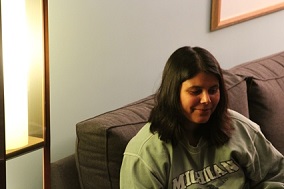 Marketing Ninja and Associate Editor Anna Stusser gives some guidelines for writing good fiction (because, really, your muse may be a knock-out, but her beauty in no way necessitates two pages of writing), explains what writing and a chimpanzee have in common, and divulges where the brilliant and bold go to find amazing literature.
Marketing Ninja and Associate Editor Anna Stusser gives some guidelines for writing good fiction (because, really, your muse may be a knock-out, but her beauty in no way necessitates two pages of writing), explains what writing and a chimpanzee have in common, and divulges where the brilliant and bold go to find amazing literature.
Q) How did you learn about/become involved with Eckleburg?
Anna Stusser: While ignoring my required reading (by taking 10 minutes to read something of my own choice), I found Eckleburg. The super long title intrigued me and I started reading its fiction and watching videos in the comedy section. The piece “Emily Applies for a Job“, made me laugh so hard, I almost rolled off my unstable wooden bed from IKEA. Naturally, I have not stopped reading Eckleburg since.
Q) What genre do you edit/what role do you have?
AS: I read fiction submissions and give my input for acceptance to their (potential) publication. Ever week is story time for me. I love it.
Q) What are you looking for in submissions?
AS: Yes, I know I am not easy to please. Try to use these bullet points as ways to help improve your writing. Of course there are always exceptions to the rules. Also, there are times when there is nothing wrong with the story per se; I just did not love it. Someone else might feel differently. Keep submitting, keep trying.
Here are some points for what I do and do not look for:
-
Clarity of imagery. I would rather read about your Omelet with tomatoes, scallions and mushrooms than a mere “I had eggs for breakfast.” I want see what is happening, not be told. Let the actions of your characters drive your story and let your descriptions paint a clear picture of the surroundings.
-
Write about characters that I cannot get out of my head. People with quirky, well-rounded, realistic and exquisite descriptions.
-
Does the character have a goal and can you convince me to root for him or her?
-
Have you already told me what is going to happen in the first line or paragraph? If so, why should I keep on reading? Lead me though your story, do not give me the resolution right away.
-
Does your use of grammar or paragraph organization enhance or distract from your piece?
-
Have you used the same word or phrase in same paragraph?
-
Like the Literarian’s Dawn Raffle, I am turned off by whining. Unless the complaints of the characters relate to the plot of your story, I would rather not hear it. I prefer stories that are likable, relatable or be disturbed by a snake-bite of poisonous truth.
-
Are you relying on clichés, stereotypes, or using any bland technique that is about as spicy as a slice of plain white bread?
-
Yes, I know your muse is beautiful, but you do not need to spend 2 full pages telling me that. Not only does it distract from your story line, but it objectifies the person you claim to elevate. Besides, most muses have dreams of their own that have little to do with their physical appearance.
Q) What have been one or two of your favorite pieces you have seen in Eckleburg so far?
AS: “Flour Riot” by Jill Birdsall was phenomenal. Every sentence is action packed and has a purpose. Her prose twists and turns and demanded my attention. Her quote “Father, Son– At the same time, above her head one last barrel heavy with flour rolled over the ledge” was very James Joyce-like.
Like most sarcastic bastards, I thoroughly enjoy Bukowski time. Every post is a cigarette for my soul, I dare say I look forward to them every week. Click here to read the latest.
Q) What are some publications you have/accomplishments you want to share?
AS:
-
My debut publication, “Race, Space and Place” was featured in Brown University’s Bluestockings Magazine
-
Francesca Lia Block once responded to my tweet on Twitter
-
Ich spreche und lese auf Deutsch
-
לייענען אויך אַ ביסל פון ייִדיש
-
Look for an upcoming piece concerning the actions from Dartmouth Lawsuit from me that will be featured in Eckleburg
Q) How do you approach writing?
AS: Most of the time, I try to approach writing with the meticulous concentration of a chimpanzee picking off insects crawling on her baby’s back and with the thunder in a lion’s roar. Additionally, I try to follow my own rules that I look for in the submission guides I listed above.
Q) In 5 words or less, describe what kind of a journal you think Eckleburg is.
AS: For the brilliant and bold
Q) Any other promotion/interesting fact/random tid bit you want to share?
AS: I am reading My Escape by Benoite Groult. For those who are interested in Feminism and French culture, you might enjoy reading while sipping some Merlot in an outdoor café.
Anna Stusser is a music maker and a dreamer of dreams. At her semi-prestigious liberal arts school in New England, it was confirmed that she lied to a cop in order to sneak back stage and bombard Noam Chomsky. Since then, she has moved down south and prepares to sprinkle her zany madness wherever she will go.



 Assistant Nonfiction Editor Vipra Ghimire discusses the Eckleburg family, what she is looking for in submissions, and how her writing practice is a psychological salvation.
Assistant Nonfiction Editor Vipra Ghimire discusses the Eckleburg family, what she is looking for in submissions, and how her writing practice is a psychological salvation.
